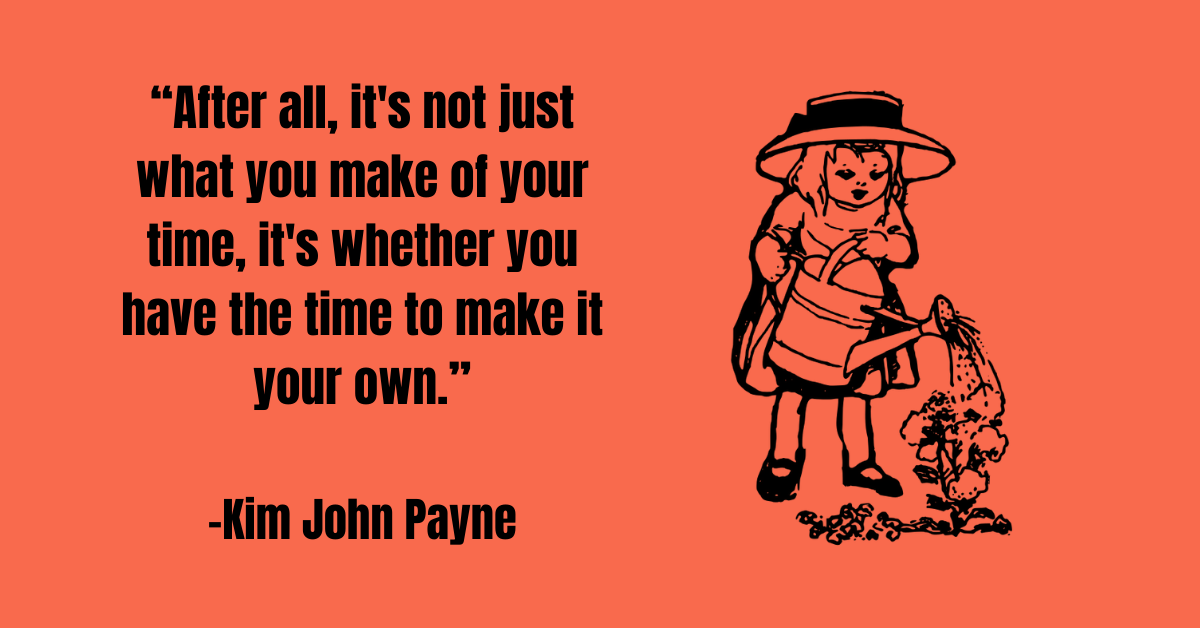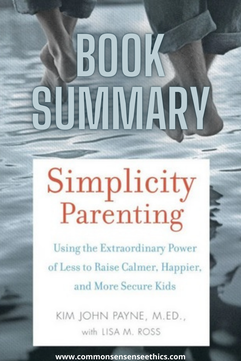I just finished reading Simplicity Parenting by Waldorf educator Kim John Payne. And well folks, it’s a keeper! In a nutshell, this book is for any parent who has watched their dreams for their kids slipping away amongst the overwhelming pace and expectations of family life today.
I was aware of this book for a while after watching some of Payne’s YouTube videos. Why the book never actively made its way onto my reading list is anybody’s guess. I think I had a baby and it fell off my radar! But fate intervened when I saw it for $1 at my library book sale.
I’ll do my best to summarize Simplicity Parenting for you below, and I highly recommend buying it or getting it at your local library.
“As parents we also define ourselves by what we bring our attention and presence to. This is easy to forget when daily life feels more like triage. By eliminating some of the clutter in our lives we can concentrate on what we really value, not just what we're buried under, or deluged with.”
Payne suggests that less is more if we want to raise calmer and happier children. He gives spot-on advice about how to simplify your home, schedule and family life so that both parents and kids can have room to breath and grow. Here's how:
1. Declutter Your Kids Environment
Avoid having too many toys available at one time. Rotate toys in and out of your child’s play area on a regular basis, and follow the following guidelines for purging excess toys:
- Trash broken toys.
- Trash toys with missing parts.
- Donate or rotate toys that your child hasn’t played with for a while.
- Always keep favorites (which are often simple figure, blocks, dolls, etc.)
2. Simplify the Rythem of Family Life
“Where well-established rhythms exist, there is much less parental verbiage, less effort, and fewer problems around transitions.”
Your dreams for your family can’t just be dreams – you need to be intentional about making them your reality. I’m big into the idea of intentionally rolling your important rituals into your daily routine so that you don’t forget to do them, or let life slide by on autopilot.
3. Don't Overschedule
Payne states:
“A child who doesn’t experience leisure – or better yet, boredom – will always be looking for external stimulation, activity, or entertainment.”
Allowing kids more time time for free play over organized activities helps to boost creativity, self reliance and happiness. It also means that stressed parents can stop running from one activity to the next and spend more quality time with their kids.
4. Filter Out the Adult World
The brain doesn’t fully mature until our mid twenties when the frontal lobe, responsible for judgment and decision-making finishes developing. Children can’t process abstract information, at least not until they reach the logic stage around age 12.
Payne recommends talking about distressing topics and world new after the kids are in bed. Honestly, I think that is sound advice. I don’t even believe in too much news consumption for adults!
How This Book Has Helped Me:
Payne recommends starting organized sports and extracurricular activities around age 8. Kids of this age are naturally transitioning away from imaginary play and are ready for the challenge of sports and (limited) extracurriculars outside the home. (Organized activities should never dominate our schedules though.)
Up until the age of about 7 or 8, Payne recommends things such as outdoor play in the neighborhood, bikes, reading, games, having kids help prep meals, chores, crafts and lots of unstructured time to learn and explore:
“After all, it's not just what you make of your time, it's whether you have the time to make it your own.”
I also really like the idea of living out you dreams for your family.
I hope this book summary is helpful to you too. Please comment below if you have anything to add.
*This post contains Amazon Affiliate links. I may earn a small commission from any purchases.
~
Read Next:
The Secret to Building a Close Family
Virtue Begins at Home With Intentional Family Culture
Tranquility Parenting: Book Review and Video











